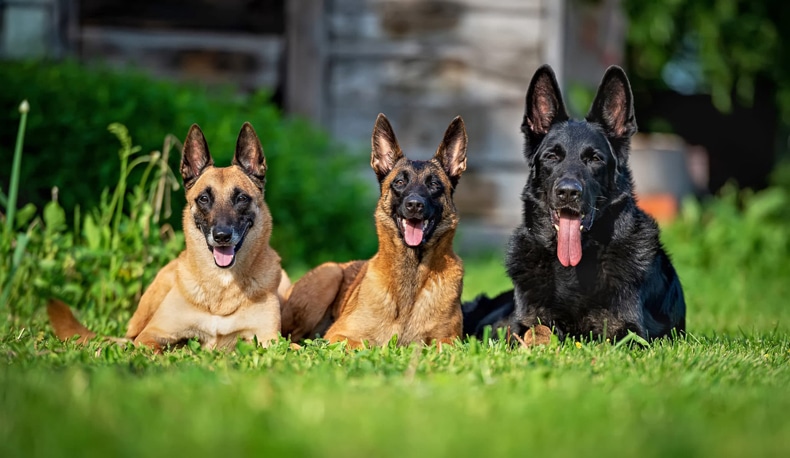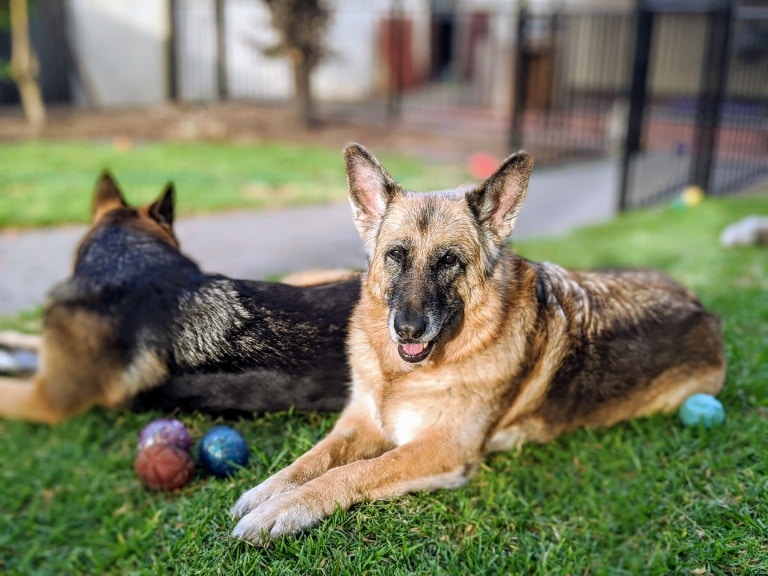Meet the Five Types of German Shepherds: The Big Dogs That Make for Good Pets

German Shepherds are one of the most popular dog breeds in the world. Stoic and beautiful, hard-working and loyal, these breeds are used for a variety of tasks, including herding sheep, protecting livestock, acting as service animals for people with disabilities, and working with law enforcement and the military. German Shepherds can also make good pets! If you’re considering adding a German Shepherd to your household, it’s important that you know about the five different types before you adopt one. This blog will talk about each type of German Shepherd: what they look like, their temperament, and whether or not they make good pets. It’s always a good idea to make an informed decision before taking on the joy and responsibility of owning one of these majestic dogs.
West-German Working Line
The West-German Working Line is widely considered the most popular type of German Shepherd. They’re a medium-sized dog, and they have short hair that’s easy to maintain. This breed makes for excellent pets because they tend to stay calm around new people and animals. That means they are fairly easy to train and are usually very receptive to the process. Originally bred for sheep herding, West German Working Line German Shepherds are also intelligent and protective. Families with young children often prefer this breed because of their easy-going nature and vigilant dedication to keeping everyone safe.
East-German DDR Working Line
East-German DDR Working Line German Shepherds are on the bigger side when compared to the four other types, and they can sometimes seem a little intimidating, at first. They have a thick double coat that’s easy to maintain in wet or dry weather, and they often work as police dogs, military dogs, and search and rescue dogs. This type of German Shepherd is very intelligent but can be aggressive towards strangers. They often make better working or guard dogs than pets. Families with young children and little time to devote to training or exercising this breed in the ways it requires should fully consider the commitment involved before adopting one.
Czech Working Line
The Czech Working Line is the smallest type of German Shepherd. They have a short or rough coat that’s easy to maintain, and they often work for search and rescue teams. These types of German Shepherds are not very intelligent, but they make good family pets, especially when compared to the East-German DDR Working Line that can be aggressive towards strangers.
American Show Line
American Show Line German Shepherds have been bred for show purposes, so they require more grooming and care than other types of German Shepherds. They have a long coat that’s easy to maintain (when compared with other breeds of show dogs), but they are not likely to do well in working or guarding situations. The American Show Line, while iconic in appearance, is generally less practical than the previous three breeds. As pets, they can be aggressive towards strangers, and they tend to have a lot of energy. Plan to spend plenty of time exercising them and making sure they’re sufficiently mentally stimulated to avoid some of the behavioral issues that can arise from boredom.
European Show Line
European Show Line German Shepherds are, for all intents and purposes, the same as the American Show Line, but they require less grooming due to their shorter coat. Like their American counterparts, they are bred mainly for show purposes. Unlike their American counterparts, however, they often work as service dogs or as guard animals. They make good pets, as long as you can provide ample stimulation and exercise.
Should You Adopt a German Shepherd?
When considering the right dog for you, it’s important to be honest with yourself about what your needs are as a prospective pet owner, and whether you can provide for the unique needs of a given breed of dog. Getting a dog is, after all, a huge commitment. You’re not just adopting; you’re making a friend. Generally speaking, all German Shepherds will require a significant amount of exercise, attention, and training to ensure a healthy, balanced life. Because of their fierce loyalty, you will likely need to board your German Shepherd rather than leaving them with friends or family when traveling. Show dogs will require more maintenance and care, which means more trips to the dog groomer. Big dogs are more expensive to feed than small ones. These are just some of items you should consider before making your decision. For more information, don’t hesitate to contact a member of our expert staff at K9U Chicago. We’re always here to help you find the best fit for the role of your new furry friend.



